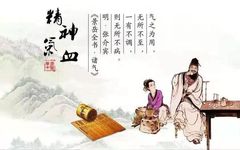Five Organs: Liver (Gan), Heart (Xin), Spleen (Pi), Lung (Fei), Kidney (Shen).
Six Bowels: Gallbladder (Dan), Small Intestine (Xiao Chang), Stomach (Wei), Large Intestine (Da Chang), Bladder (Pang Guang). Five Elements: Wood (Mu), Fire (Huo), Earth (Tu), Metal (Jin), Water (Shui). Five Colors: Green (Lu), Red (Hong), Yellow (Huang), White (Bai), Black (He). Five Tastes: Sour (Suan), Bitter (Ku), Sweet (Gan), Spicy (Xin), Salty (Xian). Five Grains: Wheat (Mai), Sorghum (Shu), Millet (Ji), Rice (Dao), Beans (Dou). Five Animals: Chicken (Ji), Sheep (Yang), Cow (Niu), Horse (Ma), Pig (Zhu). Five Fruits: Plum (Li), Apricot (Xing), Jujube (Zao), Peach (Tao), Chestnut (Li Zi). Five Emotions: Anger (Nu), Joy (Xi), Thoughtfulness (Si), Sadness (Bei), Fear (Jing Kong). Five Orifices: Eyes (Yan), Tongue (She), Mouth (Kou), Nose (Bi), Ears (Er). Five Fluids: Tears (Lei), Sweat (Han), Saliva (Kou Shui), Mucus (Ti), Spit (Tuo Ye). Five Sounds: Call (Hu), Laughter (Xiao), Song (Ge), Cry (Ku), Moan (Shen). Five Strains: Prolonged walking injures the liver, prolonged viewing injures the heart, prolonged sitting injures the spleen, prolonged lying injures the lungs, prolonged standing injures the kidneys. Five Qi: Wind (Feng), Heat (Re), Dampness (Shi), Dryness (Gan), Cold (Han). Five Directions: East (Zhu Sheng Fa), South (Shu Yang), Center (Da Di), West (Zhu Su Jiang), North (Zhu Han). Five Seasons: Spring (Chun), Summer (Xia), Long Summer (Chang Xia), Autumn (Qiu), Winter (Dong). Five Officials (Functions): General’s Official, Monarch, Advisor’s Official, Minister’s Official, Strongman’s Official.
Correspondence of Five Organ Diseases with the Body: Liver – Tendons (Jin)/Nerves (Shen Jing).
Heart – Blood Vessels (Xue Mai), Throat (Yan). Spleen – Flesh (Rou)/Limbs (Si Zhi)/Mouth (Kou). Lung – Skin (Pi Fu). Kidney – Bones (Gu).
Notes:
Five Orifices:
1. The liver opens to the eyes: Sufficient liver yang makes the eyes bright; insufficient liver qi leads to sunken eyes and fatigue. Large eye bags indicate long-term liver qi stagnation, often resulting in irritability. 2. The heart opens to the tongue: A pink tongue with thin white coating indicates health; a red tip or black spots indicate heat in the heart, leading to irritability and insomnia.
3. The spleen opens to the mouth: Sufficient spleen qi results in pink lips and no bad breath; pale lips with bad breath indicate insufficient spleen yang; dry and bright lips indicate internal heat. 4. The lung opens to the nose: A large and prominent nose indicates strong lung function; a small and flat nose indicates weak lung function. Enlarged pores on the nose may lead to rhinitis and allergies. 5. The kidney opens to the ears: Thick and large earlobes indicate insufficient congenital energy; poor hearing and tinnitus are signs of kidney deficiency.
Five Fluids:
1. Tears: Tears are transformed from liver qi and blood; crying can relieve liver stagnation and detoxify, but excessive crying harms liver blood, leading to dry eyes. 2. Sweat: Sweat is the fluid of the heart; excessive sweating depletes yin fluids. 3. Saliva: Clear saliva indicates cold spleen; sticky saliva indicates heat in the spleen (spleen-stomach damp-heat); excessive saliva indicates spleen deficiency and internal dampness, avoiding cold foods is advised. 4. Mucus: Clear nasal discharge indicates insufficient lung yang and body cold; yellow nasal discharge indicates lung yin deficiency and internal heat.
5. Spit: Excessive saliva indicates kidney cold and deficiency.
Five Sounds:
1. Call: When eyes are dry and one feels irritable, inhaling and calling can brighten the eyes, relieve stagnation, and calm liver fire. 2. Laughter: Laughter can relieve worries, but excessive joy can harm the heart. 3. Song: An excessive love for karaoke indicates heat in the stomach. 4. Cry: Those with insufficient lung qi tend to cry easily. 5. Moan: Unexplained fear and moaning are signs of kidney disease. Five Strains:
1. Prolonged viewing injures blood – the heart governs blood. 2. Prolonged lying injures qi – the lung governs qi. 3. Prolonged sitting injures flesh – the spleen governs flesh. 4. Prolonged standing injures bones – the kidney governs bones. 5. Prolonged walking injures tendons – the liver governs tendons.
Seven Injuries:
1. Worry and overthinking injure the heart. 2. Great anger injures the liver. 3. Overeating injures the spleen. 4. Prolonged sitting in damp areas injures the spleen. 5. Overconsumption of cold drinks injures the lungs. 6. Fear and lack of moderation injure the kidneys. 7. Wind, rain, cold, and heat injure the body. Five Colors:
1. A green face indicates a love for alcohol, anger, and a bad temper. 2. A red face indicates poor heart health. 3. A waxy yellow face indicates disharmony in the spleen and stomach. 4. A pale face indicates asthma. 5. A dark face indicates kidney failure. Five Seasons: The human body corresponds to the seasons; different seasons and times require adjustments in different organs: Spring: Regulate the liver.
Summer: Regulate the heart.
Autumn: Regulate the lungs.
Winter: Regulate the kidneys.
Transition from summer to autumn: Regulate the spleen and stomach.
Summer nourishes yang, winter nourishes yin. Early regulation of heart and lungs, late regulation of liver and kidneys, and constant regulation of spleen, stomach, and gallbladder.
Starting from November 1, to meet the diverse needs of readers, the content of the public account will be adjusted accordingly, adding educational and financial content to the existing health section. The original health section will now focus on TCM theory, emphasizing a macro perspective on health and combining it with micro case studies. We look forward to every effort being made to provide you with better assistance! Thank you for your continued support!

